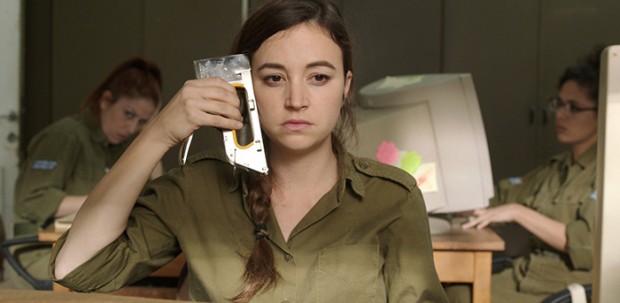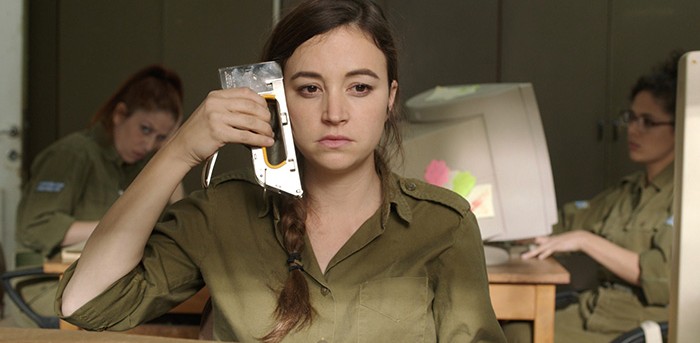Delicately shifting from laugh-out-loud comedy to dealing with complicated issues such as suicide and rape, Zero Motivation, the debut feature from Israeli director Talya Lavie is one of the year’s most accomplished. Our review states that “Lavie for all intents and purposes gives us American cubicle humor as transplanted to the Israeli warfront. A hilarious analogy for us, it’s a head-smacking expose of absurdity for those who’ve lived it there.”
We recently had the chance to discuss the film, which is now in limited release, with the writer-director, who returns to the country after winning the major awards at Tribeca Film Festival earlier this year. We discussed how she came about creating the film, the balance of comedy and drama, its reception in Israel and elsewhere, being influenced by Stanley Kubrick, Terrence Malick and Robert Altman, her experience at the Sundance Labs, and more. Check out the full conversation below.
The Film Stage: We certainly wouldn’t see this kind of film from an American director. What led to its concept and then the execution of it?
Talya Lavie: So, I’m an Israeli filmmaker. I went to an art academy in Jerusalem and studied animation at first and then I went to film school in Jerusalem and I started making short films and started to work for television and as a screenwriter and as a director. In the meantime I was working on the script for my first feature film, Zero Motivation. So that’s basically my background. I served in the IDF because it’s mandatory in Israel as you probably know. I was a secretary, like many other girls. Not all the women in IDF are secretaries, some of them are combat, but there is a major group that are secretaries. I thought that it could be funny since so many classic army scenes feature Israelis and Americans. I thought it would be funny to some of the elements of this genre — the heroic vibe — and to use it on an army story that happens almost solely instead an office.
Nowadays a lot of comedies feel a bit neutered with issues they won’t deal with. Your film deals with serious issues such as rape and suicide in the midst of comedy. How did you find that balance?
Yeah, at first I was always connected to comedy and I always loved comedies. The comedies I liked the most were the ones that were actually sad. Some teacher in my film school once told me, “It’s the saddest people who make comedy.” So I think that is true. I knew from the beginning that I wanted to mix the genre a little bit. My challenge was to keep the tone of the film and to move from parts that are really sad to parts that are really funny. I found out that sometimes the best way to do this is to have very strong cuts — cutting between them. I put in this film a large scale of emotions so we call it a dark comedy, but it really deals with a large scale of emotions.

You’ve mentioned comedies that might be an influence on this, MASH?
Yes, MASH and Catch-22. Those were great inspirations and Charlie Chaplin comedies, of course. They are hilarious and yet so sad.
I think a gun is only fired a few times and there are no battle scenes here, but are there any war films that inspired you as a filmmaker?
Yeah, I really love Full Metal Jacket and Apocalypse Now and Platoon and The Thin Red Line. I can’t even count, there are so many great army films. Also, in Israel we have a great tradition of great army movies.
Do you want to highlight any of those?
There is Waltz with Bashir and Beaufort and Lebanon.
I wouldn’t call this an inherently political film, but it’s definitely a side to it.
Yes, it’s political in the sense that it’s political about Israeli society and the way the political situation affects Israeli society. You don’t see the conflict and the Palestinians, the things that are going on, because you are focusing on people that are really not involved directly in those issues. It’s still the environment as you go through the war inside the office.
You’ve toured this film in many countries, I presume. Have you seen a different response in different countries?
We expected it to be more different than it turned out to be, because the film is very much inspired by the culture. It has a lot of inside jokes and humor, but when we came to Tribeca — we premiered the film here in Tribeca — and we didn’t know what to expect, but the audience responded so great to this film and we won two awards. We realized the film is more universal then we thought. Again, because to an extent it’s about democracy and it’s about being a small unimportant part of the big system. So many people can relate to that situation.
In Israel, it did set a box-office record. Is that correct?
Yes, that’s true.
 Were you taken aback by that?
Were you taken aback by that?
It was released in Israel in June and it got great reviews. Most of the publicity was from one person to another — word of mouth. We didn’t have huge posters or huge publicity for it. It was immediately something that people talked about and I’m very happy. Because we have such a great tradition of army films in Israel, so I really wanted to add this film to that. A lot of people told me that the film was necessary for them and that’s something I was very thrilled to hear. So, yeah, a lot of people related to it and the most surprising thing was sometimes when you make a movie people ask, “What’s the audience for this film?” I thought it would be for those in their 30’s because it happened in 2003 or 2004 so I figured people serving in the army around that time would be most related to it but then we were surprised that people from all ages related to it. From eight years old to sixty.
Yeah, it can act as a coming-of-age film.
Yeah.
Did you take part in the Sundance Labs?
Yeah, I was very, very lucky to be accepted to this. I applied to the Sundance Institute and I was very, very lucky to get in there. It was a really life-changing experience. It’s a dream for every filmmaker to take part in such a great lab.
In Israel is there anything like that?
Yes, there are some. Jerusalem Screenwriters Lab, but the Sundance Lab is something known all over the world. I went to the Directors Lab there. I haven’t heard of it anywhere else. I got to work with great American actresses and to have great advisors and to try some things from the film and to be fearless and not to feel that anybody criticized me and to be very creative. I have only great things to say about this lab and what they did.
Did any changes to the film stem from the lab?
It’s not changes, but things that I realized about the script. It has a lot of nuance of the language and translating to English — I’m not a native English speaker so I don’t have this…
Background.
Yes, I can’t use language like I do in Hebrew. So it taught me so much because I had to only deal with the drama. I learned a lot of things and I got to experience and try things not under pressure of making of film, but with the joy of creation.
That’s great. Because of the success of the film in Israel and hopefully here upon its release, has that led to bigger opportunities?
Well, this year I hope to raise money for film the next time. But, yeah, I’m not looking for any other opportunities other than making more films. That’s what I want to do.
This film definitely has a rewatchability factor.
Thank you so much.
Some directors though, after they are done with the film, they want to put it away and don’t watch it again. Do you have that feeling?
Yeah, I kept watching it because I was worried about it. I wanted to make sure everything goes well, technically wise and all that. When it premiered in Tribeca I was very curious to see the audience response. Yes, I’ll rewatch it but I don’t just go to the cinema to watch it, stuff like that. I’ve really watched it a lot. This film is actually fun to watch it again and again. Really, I’m not saying it because I’ve made it. [Laughs]
This being your first feature, when you see the final product is it how you envisioned it?
Yes, I’m very happy with the film, but it’s a process. You go through this process all the time and everything new becomes the reality. You shoot the film, you find a location, you find the actors, you find the scene, then you have the material. You treat the film differently while you edit it. Then the question is how to cut. So every time you take a step, you don’t even remember what you thought before. The bottom line is that, yes, I got a lot of what I wanted and I’m very happy with it.
Zero Motivation is now in limited release.

